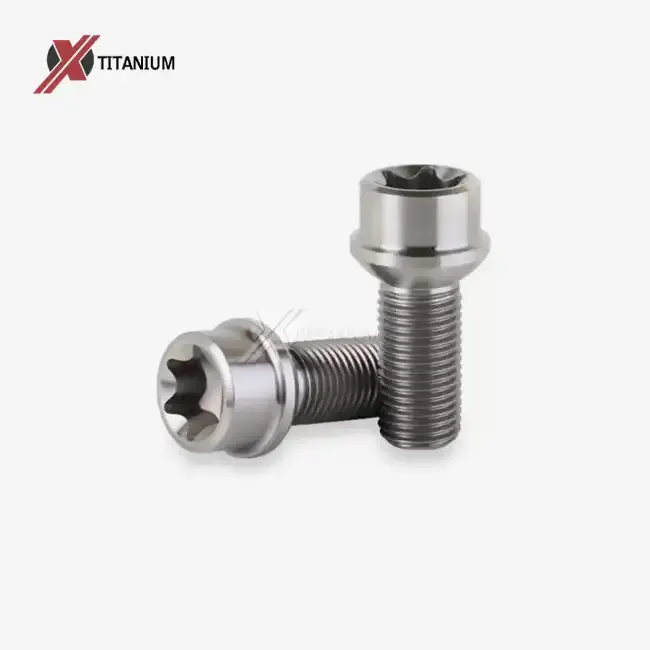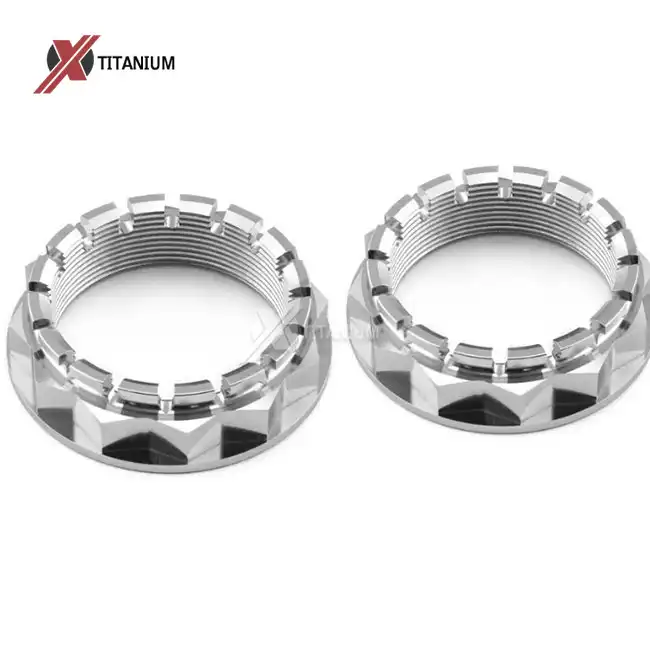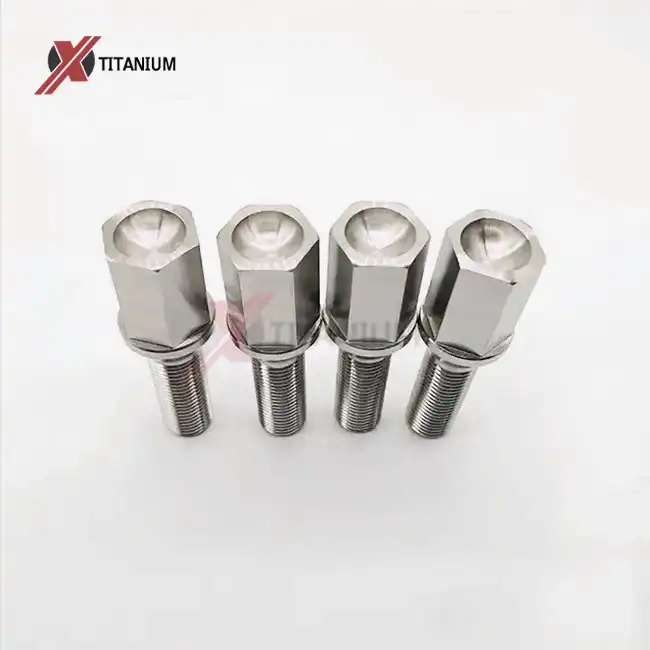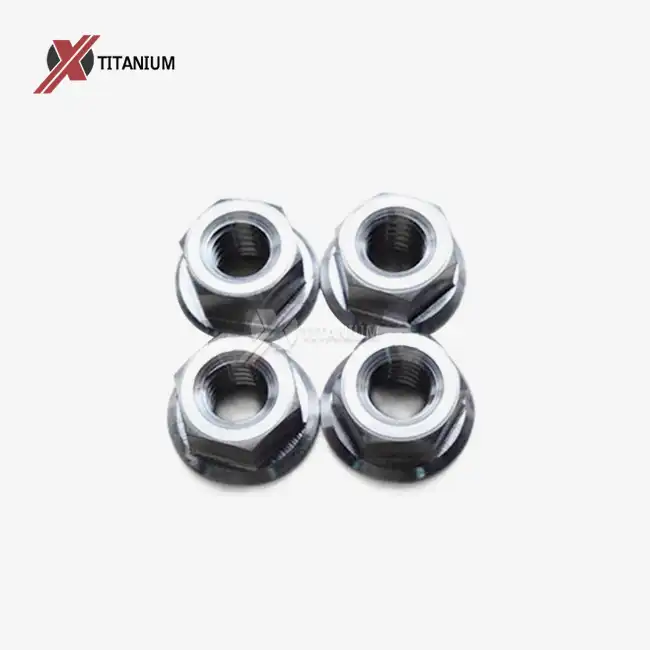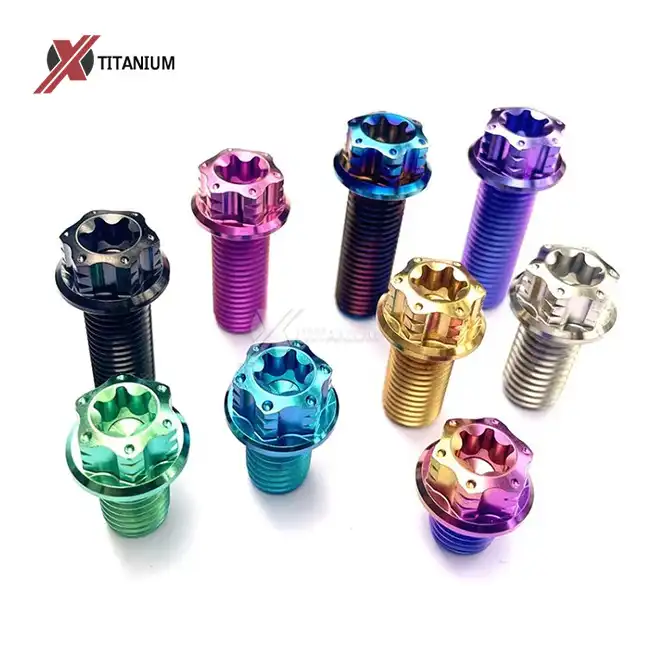The Evolution of Wheel Fasteners: From Steel to Titanium
The journey of wheel fasteners has been a testament to automotive engineering progress. Traditional steel lug bolts have long been the industry standard, valued for their strength and cost-effectiveness. However, as vehicle designs have become more sophisticated and performance demands have increased, the limitations of steel fasteners have become apparent.
Enter titanium wheel lug bolts, a game-changing innovation that addresses many of the shortcomings of their steel counterparts. These advanced fasteners offer a superior strength-to-weight ratio, exceptional corrosion resistance, and improved thermal properties. The transition from steel to titanium represents a significant leap forward in automotive fastener technology.
Advantages of Titanium Wheel Lug Bolts
Titanium wheel lug bolts boast several advantages over traditional steel fasteners:
- Weight Reduction: Titanium's low density translates to significant weight savings, contributing to overall vehicle lightweighting efforts.
- Corrosion Resistance: Unlike steel, titanium forms a natural oxide layer that protects against rust and environmental degradation.
- High Strength: Despite being lighter, titanium bolts offer comparable or superior strength to steel, ensuring optimal wheel security.
- Thermal Stability: Titanium maintains its structural integrity under extreme temperatures, crucial for high-performance applications.
- Longevity: The durability of titanium wheel lug bolts often results in a longer service life compared to steel alternatives.
These properties make titanium wheel lug bolts particularly appealing for performance-oriented vehicles and those operating in harsh environments.
Impact on Vehicle Performance
The adoption of titanium wheel lug bolts can have a noticeable impact on vehicle performance:
- Reduced Unsprung Weight: Lighter wheel components improve suspension responsiveness and handling.
- Enhanced Acceleration: Lower rotational mass allows for quicker acceleration and improved fuel efficiency.
- Better Braking: Reduced wheel weight can contribute to shorter stopping distances and improved brake cooling.
- Improved Ride Quality: Lighter wheels can help dampen vibrations and reduce road noise.
While the performance gains may seem incremental, in the world of high-performance automobiles, every advantage counts.
Manufacturing Processes and Quality Control
The production of titanium wheel lug bolts involves sophisticated manufacturing processes to ensure the highest quality and reliability. CNC machining is often employed to achieve precise dimensions and tolerances critical for proper fitment and performance.
Material Selection and Processing
The choice of Ti-6Al-4V (Grade 5) titanium alloy is deliberate, offering an optimal balance of strength, machinability, and corrosion resistance. This alloy undergoes careful heat treatment to enhance its mechanical properties further. The raw material is typically sourced from reputable suppliers to ensure consistent quality and traceability.
Precision Machining
CNC machining centers are programmed to produce titanium wheel lug bolts with exacting specifications. The process involves:
- Turning operations to form the bolt shank and thread profile
- Milling to create hex or other drive head geometries
- Threading using specialized cutting tools designed for titanium
- Precision grinding to achieve final dimensional tolerances
Each step is carefully monitored and controlled to maintain consistency across production batches.
Surface Treatments and Finishes
After machining, titanium wheel lug bolts often undergo additional surface treatments to enhance their properties or appearance:
- Anodizing: Creates a protective oxide layer and allows for color customization
- Polishing: Improves corrosion resistance and aesthetic appeal
- Nitriding: Enhances surface hardness and wear resistance
- DLC Coating: Provides additional protection and reduces friction
These treatments not only improve the bolts' performance but also allow for customization to match vehicle aesthetics.
Quality Assurance Measures
Rigorous quality control processes are implemented throughout the manufacturing of titanium wheel lug bolts:
- Material composition analysis to verify alloy specifications
- Dimensional inspections using high-precision measuring equipment
- Tensile strength and hardness testing to ensure mechanical properties
- Thread gauging to verify thread pitch and fit
- Visual inspections for surface defects or finish inconsistencies
These measures ensure that each titanium wheel lug bolt meets or exceeds industry standards and customer expectations.
Applications and Future Trends
While titanium wheel lug bolts have found a niche in high-performance and luxury vehicles, their potential applications are expanding. As manufacturing processes become more efficient and costs decrease, we may see these advanced fasteners in a broader range of vehicles.
Current Applications
Presently, titanium wheel lug bolts are primarily used in:
- Formula 1 and other motorsport vehicles
- High-end sports cars from manufacturers like Porsche, Ferrari, and McLaren
- Luxury vehicles emphasizing performance and exclusivity
- Aftermarket upgrades for enthusiasts seeking weight reduction and improved aesthetics
These applications showcase the benefits of titanium wheel lug bolts in demanding environments where performance is paramount.
Emerging Markets and Opportunities
As the automotive industry evolves, new opportunities for titanium wheel lug bolts are emerging:
- Electric Vehicles: Weight reduction is crucial for extending range, making titanium fasteners attractive for EV manufacturers.
- Autonomous Vehicles: Improved reliability and reduced maintenance needs align with the requirements of self-driving cars.
- Commercial Vehicles: Long-haul trucks and buses could benefit from the durability and corrosion resistance of titanium fasteners.
- Aerospace Crossover: Technologies developed for aircraft wheel fasteners may find applications in high-end automotive markets.
These emerging markets present exciting opportunities for the expansion of titanium wheel lug bolt usage.
Future Innovations
Looking ahead, several innovations may further enhance the appeal of titanium wheel lug bolts:
- Advanced Alloys: Development of new titanium alloys with improved properties specifically tailored for automotive applications.
- Smart Fasteners: Integration of sensors to monitor torque, temperature, and other parameters for enhanced safety and maintenance.
- Additive Manufacturing: 3D printing technologies may enable more complex bolt designs and localized production.
- Hybrid Materials: Combining titanium with other advanced materials to create fasteners with optimized properties.
These innovations could further solidify the role of titanium wheel lug bolts in the automotive industry of the future.
Conclusion
Titanium wheel lug bolts speak to a noteworthy progression in car latch innovation. Their one of a kind combination of quality, light weight, and erosion resistance positions them as a key component in the future of high-performance and extravagance vehicles. As fabricating forms move forward and costs diminish, we may see these progressed latches ended up more predominant over different vehicle segments.
The progressing advancement of titanium combinations, surface medications, and inventive plans proposes that the potential of titanium wheel lug bolts has however to be completely realized. As the car industry proceeds to thrust the boundaries of execution, effectiveness, and supportability, these progressed clasp will likely play an progressively critical part.
For those interested in exploring the possibilities of titanium wheel lug bolts for their vehicles or applications, Baoji Chuanglian New Metal Material Co., Ltd. offers expertise in titanium product manufacturing and customization. To learn more about our titanium fastener solutions, please contact us at info@cltifastener.com or djy6580@aliyun.com.
